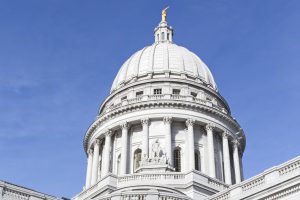 On August 24, 2020, Assembly Speaker Robin Vos (R-Rochester) created a task force to focus on racial disparities, educational opportunities, public safety, and police policies and standards in Wisconsin.
On August 24, 2020, Assembly Speaker Robin Vos (R-Rochester) created a task force to focus on racial disparities, educational opportunities, public safety, and police policies and standards in Wisconsin.
The task force formed two subcommittees: (1) a Subcommittee on Law Enforcement Policies and Standards (19 members); and (2) a Subcommittee on Education and Economic Development (13 members). Representatives Steineke and Stubbs served as co-chairs of the first subcommittee, in addition to serving as co-chairs of the full task force. The task force co-chairs appointed Representatives Kalan Haywood and Robert Wittke as co-chairs of the second subcommittee, which was tasked with exploring issues relating to racial disparities in education and economic conditions.
The following selected K-12 education-related items were taken from the report of the Subcommittee on Education and Economic Development and summarize the subcommittee’s recommendations and consensus items. Note: items that begin with “Some subcommittee members recommend…” (FORT alternative, full-day 4K) likely indicates the subcommittee was not able to reach consensus.
Recommendations
INCREASE THE NUMBER OF TEACHERS OF COLOR
- The subcommittee recommends expanding eligibility for the Minority Teacher Loan Program and outreach to potentially eligible students pursuing teaching degrees. Specifically, the subcommittee recommends either eliminating the requirement for a student to pursue licensure in a “shortage area,” or alternatively, expanding the types of teacher licensure eligible for the program beyond the identified “shortage areas.”
- The subcommittee also recommends relaxing the requirements for loan forgiveness so that a teacher is not required to teach in a shortage area to be eligible, and is required to teach in a school district with a lower percentage of minority students than the current 40 percent threshold. Finally, the subcommittee recommends requiring institutions of higher education that offer teacher preparatory programs to do active outreach to students of color enrolled in those programs to inform them about the Minority Teacher Loan Program and offer assistance in applying for loans.
- Some subcommittee members recommend providing an alternative method of demonstrating competence in literacy instruction for applicants for licensure. At minimum, the subcommittee recommends allowing individuals applying for licensure to teach in kindergarten to grade 5 to utilize the alternative currently available to applicants for special education licensure. This will allow licensure applicants to demonstrate completion of a course meeting specific requirements in lieu of a passing score on the Foundations of Reading Test (FORT).
IMPROVE EARLY LITERACY FOR CHILDREN OF COLOR
- The subcommittee recommends implementing individualized reading plans for students who demonstrate a substantial reading deficiency in any grade 4K to 3 and state-funded support for teacher training on scientifically based reading instruction and intervention. The subcommittee further recommends requiring school districts to administer additional reading assessments for students in grades 4K to 3 who are not reading at grade level.
- The subcommittee recommends that state law require DPI to create a comprehensive literacy plan, and require school districts to follow and implement the literacy plan.
- The subcommittee recommends that state law specify literacy priorities at the elementary level, and require all school districts to use a comprehensive, research-based program addressing phonics, phonemic awareness, comprehension, vocabulary, and fluency.
- The subcommittee recommends that state law require DPI to conduct an evaluation of teacher preparatory programs to ensure sufficient, evidence-based instruction for prospective teachers on teaching literacy.
- The subcommittee recommends that the state elevate reading and math proficiency for all students in early grades, with a particular focus on students of color, by facilitating public-private partnership programs with nonprofit organizations and other entities and foundations. This may include expansion of existing state-initiated programs, such as the online early learning pilot program, or by encouraging and facilitating local school districts to enter into these partnerships with programs such as Boys and Girls Clubs and the Literacy Lab Leading Men Fellowship.
Provide Funding for Full-Day, Four-Year-Old Kindergarten
- Some subcommittee members recommend that students attending full-time 4K be counted in the same manner as students attending other grade levels (1.0 pupil for membership purposes) in order to provide additional funding and incentivize districts and schools to offer 4K programming full-time, five days per week. At a minimum, the subcommittee recommends that 4K students enrolled in a district or school with a high percentage of low-income students of color be counted as 1.0 pupil for membership purposes. (This item was also recommended by the 2019 Blue Ribbon Commission on School Funding.)

